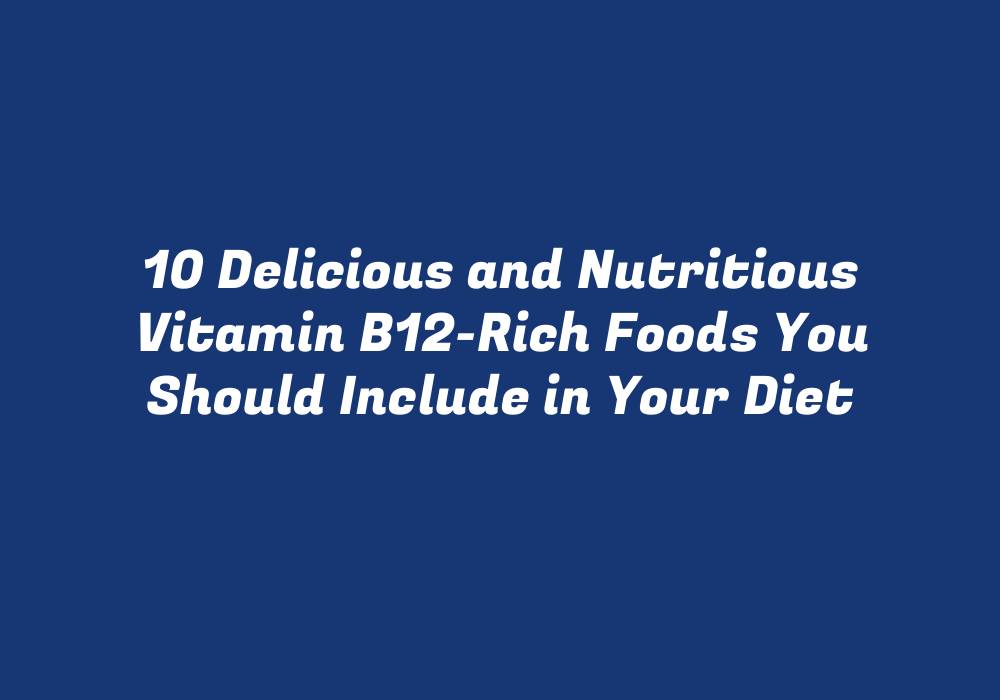Introducing Vitamin B12: Its Importance and Benefits for Your Body
Vitamin B12, also known as cobalamin, is a vital nutrient that plays a crucial role in many processes within your body. This water-soluble vitamin primarily assists with the formation of red blood cells, DNA synthesis and the maintenance of nerve health. A deficiency in this essential nutrient can lead to anemia, neurological issues, fatigue, depression, and impaired cognitive function. To ensure you get enough Vitamin B12, it is crucial to include a variety of food sources rich in this vital nutrient in your daily diet.
10 Delicious and Nutritious Vitamin B12-Rich Foods
1. Eggs
Eggs are a fantastic source of high-quality protein, vitamins, and minerals, including Vitamin B12. One large egg contains approximately 0.6 micrograms (mcg) of the vitamin. They can be enjoyed in various ways – boiled, poached, scrambled or even hard-boiled for a quick snack or meal addition.
2. Fish
Several types of fish are excellent sources of Vitamin B12 due to their marine environment and diet. Fatty fish like salmon, tuna, mackerel, and herring have higher concentrations compared to leaner fish such as cod or haddock. Salmon, for example, contains around 3.0 mcg of the vitamin per 100 grams serving size.
3. Lean Meats
Animal meats like beef and poultry can be great sources of Vitamin B12 if they are lean and consumed in moderation as part of a healthy diet. A 100 grams serving of roast beef provides approximately 2.4 mcg of the vitamin, while chicken contains about 2.3 mcg per 100 grams.
4. Dairy Products
Dairy products such as milk, yogurt, and cheese are typically fortified with Vitamin B12 to compensate for its natural absence in these foods. However, the vitamin content can vary among different brands and types of dairy products. Make sure to check the nutrition labels when selecting your favorite options.
5. Beans and Legumes
Vegetarians may find Vitamin B12 in plant-based foods, although it can be challenging to get enough through diet alone due to the limited natural sources of this nutrient. Some beans and legumes, such as soybeans and tempeh, have been fortified with vitamins, making them valuable options for those looking to increase their Vitamin B12 intake.
6. Nuts and Seeds
Although nuts and seeds are not high in Vitamin B12 on their own, some fortified nut butters and seed spreads can contain added amounts of the vitamin. These options can be excellent alternatives for those who follow a plant-based diet or have dietary restrictions.
7. Fortified Grains
Certain grains like breakfast cereals, bread, and pasta have been fortified with Vitamin B12 to provide an additional source of this vital nutrient for vegans and those who restrict their consumption of animal products. Always check the product’s labeling for specific information about Vitamin B12 content.
8. Seaweed
Seaweed, particularly Nori sheets used in sushi rolls, can be a great source of Vitamin B12 and other essential nutrients. A single Nori sheet typically contains around 4-5 mcg of the vitamin. However, it’s important to keep in mind that seaweed consumption may vary depending on its sourcing and processing methods.
9. Soy Products
Soy products like tofu and tempeh are often fortified with Vitamin B12, making them excellent options for vegetarians and those who avoid animal-derived foods. However, it is essential to read the product labels carefully as Vitamin B12 content can vary among different brands and manufacturing methods.
10. Nutritional Yeast
Nutritional yeast is a deactivated strain of Saccharomyces cerevisiae that has an incredible cheesy, nutty flavor, making it popular among vegans as an alternative to cheese and butter. It is fortified with Vitamin B12, providing a significant boost to one’s daily intake when incorporated into various dishes.
Conclusion
Ensuring that you have enough Vitamin B12 in your diet is essential for maintaining overall health and wellness. By incorporating a variety of foods from the list above, individuals can enjoy delicious meals while meeting their daily requirements of this crucial nutrient. Remember to consult with a healthcare professional if you have specific concerns or questions regarding your individual needs.
